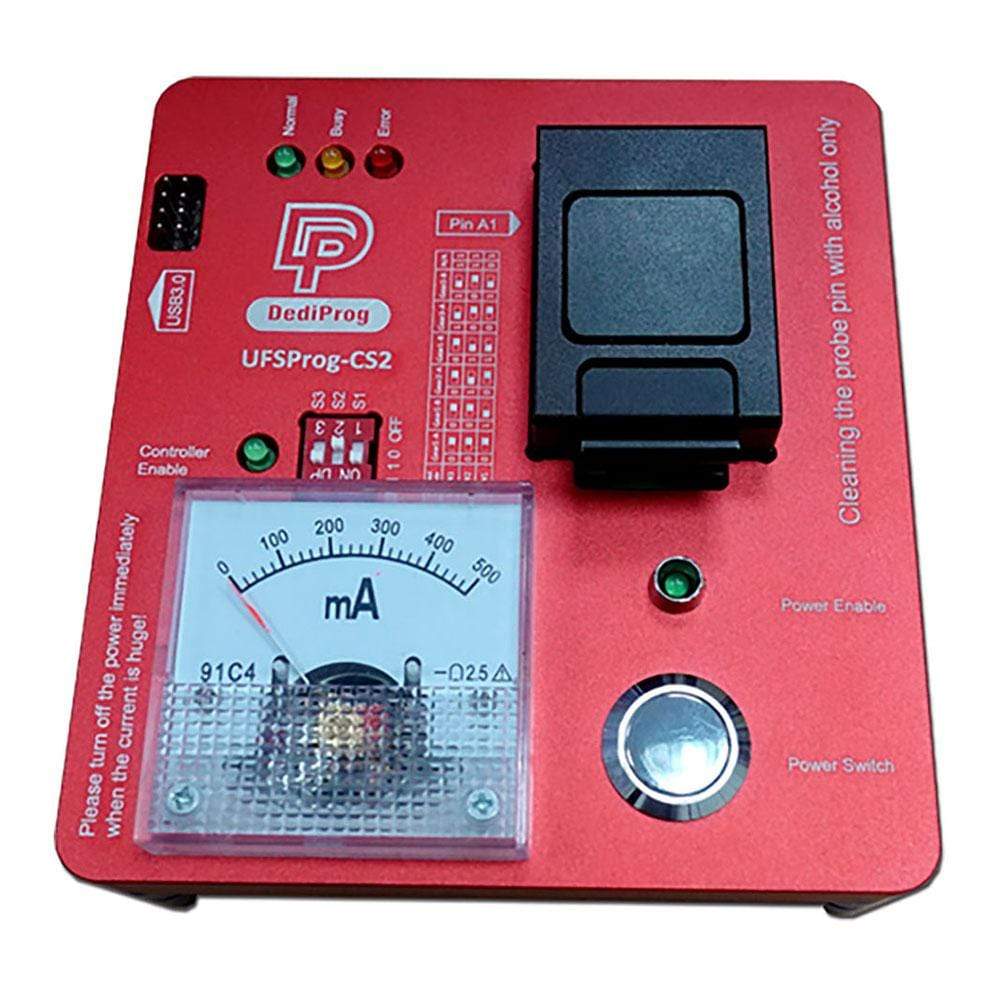
Key Features
Overview
The Dediprog UFSProg-CS2 represents the latest advancement in Universal Flash Storage programming technology, designed specifically for engineering professionals requiring reliable access to UFS memory devices. This compact yet powerful reader handles the complex task of reading and writing data across multiple Logical Unit Numbers within UFS integrated circuits.
Built around the sophisticated DP7000 bridge controller IC, the UFSProg-CS2 supports UFS v2.1 specifications up to Gear 3 speed, ensuring compatibility with modern high-performance storage devices. The USB 3.1 Gen1 interface with UASP protocol delivers exceptional data transfer rates essential for forensic analysis and firmware development workflows.
Professional Series: Part of Dediprog's comprehensive UFSProg series, complementing the UFSProg-CS UFS IC Reader Board for expanded programming capabilities. For universal programming requirements, consider the NuProg-E2 Engineering Programmer supporting both UFS and eMMC devices.
The UFSProg-CS2 excels in forensic data recovery, mobile device repair, and embedded system development where precise UFS memory manipulation is critical. Its professional-grade construction ensures reliable performance backed by Dediprog's established reputation in IC programming solutions.
Downloads
Why Engineers Choose The Professional UFS IC Reader for Data Recovery and Programming
Forensic Data Recovery
Mobile Device Repair
Firmware Development
Professional UFS Programming Solution
The Dediprog UFSProg-CS2 UFS IC Reader delivers professional-grade UFS memory programming capabilities for embedded system developers, forensic analysts, and mobile device repair technicians. Built around the powerful DP7000 bridge controller IC, this compact reader provides exceptional performance for accessing and manipulating Universal Flash Storage devices.
High-Speed Data Access
Supporting UFS v2.1 specifications up to Gear 3 speed, the UFSProg-CS2 achieves optimal data transfer rates through its USB 3.1 Gen1 interface with UASP high-performance protocol. This configuration enables rapid reading and writing of data in each Logical Unit Number (LUN) of UFS integrated circuits.
| Specification | Value |
|---|---|
| UFS Support | v2.1 up to Gear 3 |
| Bridge Controller | DP7000 |
| Interface | USB 3.1 Gen1 with UASP |
| LUN Access | Full read/write capability |
Socket Compatibility
The UFSProg-CS2 accommodates various UFS BGA packages through dedicated socket adapters, supporting both socketed and in-circuit programming scenarios. The reader handles BGA153 form factors commonly found in mobile devices and embedded systems.
Socket Adapter Required
UFS socket adapters sold separately. Ensure compatibility with your target BGA package format before ordering.
Professional Applications
Essential for forensic data recovery operations, the UFSProg-CS2 provides low-level access to UFS storage devices. Mobile repair technicians utilise this tool for firmware recovery, data extraction, and storage diagnostics. Development engineers rely on its programming capabilities for UFS device initialisation and configuration.
Software Integration
Operates seamlessly with Dediprog's UFSProg software suite, providing intuitive control over UFS device operations. The software interface supports advanced features including LUN management, descriptor configuration, and attribute modification.
Quality Engineering
Manufactured to Dediprog's exacting standards, the UFSProg-CS2 delivers consistent performance in professional environments. The compact handheld design enables portable operation whilst maintaining the robustness required for production use.
Frequently Asked Questions
Have a Question?
-
Is the UFSProg-CS2 compatible with all operating systems?
The UFSProg software typically supports Windows operating systems. Check Dediprog's official documentation for current OS compatibility and system requirements before purchase.
-
What technical support is available for the UFSProg-CS2?
Debug Store provides comprehensive technical support including setup guidance, application assistance, and access to Dediprog's technical documentation and software updates for registered users.
-
Can I use the UFSProg-CS2 for eMMC devices?
The UFSProg-CS2 is specifically designed for UFS devices. For eMMC programming, consider universal programmers like the NuProg-E2 that support both UFS and eMMC standards.
-
What is the difference between UFSProg-CS2 and UFSProg-CS?
The UFSProg-CS2 is the enhanced version offering improved performance and expanded functionality compared to the original UFSProg-CS, with the same fundamental UFS programming capabilities.
-
Does the UFSProg-CS2 support in-circuit programming?
The UFSProg-CS2 primarily supports socket-based programming through dedicated adapters. For in-circuit programming applications, evaluate whether your target system provides appropriate access to UFS signal lines.
-
Is the UFSProg-CS2 suitable for high-volume production programming?
The UFSProg-CS2 is designed for engineering and forensic applications rather than high-volume production. For production programming, consider the NuProg-E2 or gang programming solutions.
-
What software is required to operate the UFSProg-CS2?
The UFSProg-CS2 operates with Dediprog's UFSProg software suite, which provides comprehensive control over UFS device operations including reading, writing, and configuration management.
-
Can the UFSProg-CS2 read encrypted UFS storage?
The UFSProg-CS2 can access UFS devices at the hardware level, but encrypted data will require appropriate decryption keys or forensic analysis techniques to recover readable information.
-
Which socket adapters are compatible with the UFSProg-CS2?
The UFSProg-CS2 requires dedicated UFS socket adapters for different BGA package formats, including BGA153 and other common UFS form factors. Socket adapters are sold separately and must match your target chip package.
-
What UFS versions does the UFSProg-CS2 support?
The UFSProg-CS2 supports UFS v2.1 specifications up to Gear 3 speed, providing compatibility with the majority of UFS devices found in modern mobile devices and embedded systems.

